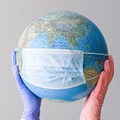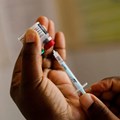Nobel Prize for mRNA pioneers amid jab controversy

The new technique they discovered involved nucleoside base modifications that enabled the development of mRNA vaccines against Covid-19.
“The discovery helped to save millions of lives during one of the worst pandemics the world has ever seen,” says Gunilla Karlsson Hedestam, professor of vaccine immunology at Karolinska Institutet and member of the Nobel Assembly. Thanks to Karikó and Weissman’s discoveries, we can use the mRNA-platform to develop vaccines and drugs for a whole range of diseases.”
In contrast to traditional vaccines, mRNA vaccines are generated internally. Once a "blueprint" of the virus protein enters cells, it prompts them to temporarily produce the protein. Subsequently, these virus proteins educate the immune system, enabling it to identify and combat the virus upon future encounters.
But scientist Denis Rancourt this week raised a red flag citing the award as "not just propaganda but a cover-up".
"That's just obscene. This is the elite rubbing our noses in it that they control all the propaganda instruments including the Nobel Prize. This cements in people's minds that this was a great discovery, that they were really trying to save humanity when pharma developed this and convinced governments to force us all to take it. The Nobel Prize has been a political instrument for a long time. This is not new.”
Rancourt is co-director of Correlation, a registered not-for-profit organisation conducting independent scientific research on topics of public interest. He was speaking on an online forum hosted by the World Council for Health on Monday, 2 October 2023, the day the Nobel Prize winners were announced.
Correlation has published over 100 articles in leading science journals and - in September this year - released a scientific report attributing mass excess all-cause mortality (ACM) to Covid-19 vaccination. "All-cause mortality means we count deaths irrespective of what the person may or may not have died from," he said.
Vaccine roll-outs and mortality
The new report, Covid-19 vaccine-associated mortality in the Southern Hemisphere authored by Rancourt as well as Marine Baudin, Joseph Hickey, and Jérémie Mercier, is based on 17 countries in the Southern Hemisphere and equatorial region. It proposes a causal link between many peaks in all-cause mortality and rapid vaccine roll-outs.
The paper states, "Nine of the 17 countries have no detectable excess ACM in the period of approximately one year after a pandemic was declared on 11 March 2020 by the World Health Organization (WHO), until the vaccines are rolled out (Australia, Malaysia, New Zealand, Paraguay, Philippines, Singapore, Suriname, Thailand, Uruguay). All 17 countries have transitioned to regimes of high ACM, which occur when the Covid-19 vaccines are deployed and administered.
"Unprecedented peaks in ACM occur in the summer (January-February) of 2022 in the Southern Hemisphere, and in equatorial-latitude countries, which are synchronous with or immediately preceded by rapid Covid-19-vaccine-booster-dose roll-outs (third or fourth doses)."
Rancourt went on to explain, “We calculate a vaccine dose fatality rate, and what we find is that the risk per injection of dying for all ages combined, and worldwide, is approximately 0.12%. This means that on a global scale, out of every 800 injections administered across all ages and population, one person will die, and the result will be causally related to the vaccine.
"This corresponds to 17 million excess deaths that have occurred in less than three years directly related to the vaccine roll-outs on the planet. In the real population, the risk of dying is a thousand times greater than what they [the pharmaceutical companies] would have us believe."
You want proof that the vaccine causes mortality?
— Denis Rancourt (@denisrancourt) September 17, 2023
You want quantification of the vaccine's fatal toxicity?
Here is our latest scientific report, published today!https://t.co/FrRf1cNjxs pic.twitter.com/e8WRGaJJoS
Further commenting on the fact that the 2023 Nobel Prize in Physiology or Medicine has been awarded for discoveries concerning the development of mRNA vaccines, Rancourt added, “There are exceptional scientists who have won the Nobel Prize who actually deserved it but [in the case of Katalin Karikó and Drew Weissman] it was not awarded purely for the science, it was mostly politically motivated.”
Meanwhile, Thomas Perlmann, secretary of the Nobel Assembly praised Karikó and Weissman: "The Covid pandemic was something of a transformative event in the history of human health, to which the laureates made an incredibly important contribution.
“We think it is very much in the spirit of the Nobel Prize to reward them for it.”
In the interim, Wikipedia has lambasted The World Council for Health - the platform on which Rancourt shared his views - as “a pseudo-medical organisation dedicated to spreading misinformation about Covid-19 vaccines”.
WHO's call for vaccination
Amidst the ongoing discourse, the WHO stresses the need for continued vaccination efforts, aiming for global access to save lives and prevent severe illness.
“Covid-19 is here to stay, and the world will continue to need tools to prevent it, test for it and treat it,” said Tedros Adhanom Ghebreyesus, WHO director-general.
He added, “Everyone, everywhere, should have access to Covid-19 vaccines. WHO is determined to maintain the momentum for increasing access to Covid-19 vaccines and will continue to support countries in accelerating vaccine delivery, to save lives and prevent people from becoming seriously ill.
“Countries should continue to work towards vaccinating at least 70% of their populations, prioritising the vaccination of 100% of health workers and 100% of the most vulnerable groups, including people who are over 60 years of age and those who are immuno-compromised or have underlying health conditions.”
The beauty of the mRNA platform, said Hedestam, is that it can be applied to assess vaccines for influenza and other infectious diseases.
“Eventually, we’ll be able to replace some of the vaccines in use today with more effective mRNA vaccines,” she says. “Clinical trials are also underway on mRNA vaccine-based cancer treatments, many of which are based on precision medicine, whereby individual mRNA vaccines are produced for each patient."
Karin Lore, a professor of vaccine immunology at Karolinska Institutet who has worked with Karikó, expressed her hope that the Nobel Prize would shed a positive light on vaccines amidst vaccine scepticism. “In this case, it’s obvious that vaccines have been incredibly useful. Billions of doses have been given and it’s hard to imagine something that has been so closely studied in terms of safety as these vaccines. I don’t know if the Nobel Prize will help, but I hope it will.”
More than 5.55 billion people worldwide have received a Covid-19 vaccine, equal to about 72.3% of the world population, and according to the Nobel Prize panel member, Rickard Sandberg 13 billion doses of the vaccine have been administered globally to date.
Katalin Karikó and Drew Weissman were not in attendance when Perlmann announced the Nobel Prize winners.






























